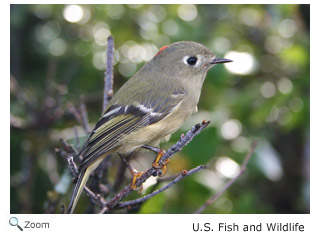 There are 6 species in this family. They are found in the Northern Hemisphere. There are two species found in North America, the golden-crowned kinglet (Regulus satrapa) and the ruby-crowned kinglet (Regulus calendula.) Kinglets are tiny birds, 3-5 inches in length. They have big rounded heads, small pointed wings, and small pointed bills. They are gray to olive in color and often have a patch on the crown of their heads. They often eat insect and spider eggs from the undersides of leaves. They also eat insects and fruit while hovering in the air! There are 6 species in this family. They are found in the Northern Hemisphere. There are two species found in North America, the golden-crowned kinglet (Regulus satrapa) and the ruby-crowned kinglet (Regulus calendula.) Kinglets are tiny birds, 3-5 inches in length. They have big rounded heads, small pointed wings, and small pointed bills. They are gray to olive in color and often have a patch on the crown of their heads. They often eat insect and spider eggs from the undersides of leaves. They also eat insects and fruit while hovering in the air!
The ruby-crowned kinglet is about 4 inches in length. It is olive-green in color with white and black bars on its wings. The male has a red crown. It lives in coniferous forests in the summer and deciduous forests in the winter. Its breeding ground stretches from Alaska across to Newfoundland, Canada south to southern California, the Great Lakes and northern New England. The golden-crowned kinglet is also olive green with white wing bars. It is about 3.5-4 inches in length. Males have a orange crown bordered with yellow; females have a solid yellow crown. The crown on both the male and female is bordered in black. Golden-crowned kinglets are found in coniferous and deciduous forests. They breed from Alaska to Newfoundland, Canada south to southern California, Michigan, Massachusetts and the mountains of North Carolina. They winter from southern Canada south to southern California, Arizona, the Gulf Coast, and northern Florida.
World Status Key
 Least Concern Least Concern  Near Threatened Near Threatened  Vulnerable Vulnerable  Endangered Endangered  Critically Endangered Critically Endangered
 Extinct in the Wild Extinct in the Wild  Extinct Extinct
Status and range is taken from ICUN Redlist. If no status is listed, there is not enough data to establish status.
US Status Key
 Threatened in US Threatened in US  Threatened in NH Threatened in NH  Endangered in US Endangered in US  Endangered in NH Endangered in NH  Breeds in NH Breeds in NH  Introduced Introduced
Status taken from US Fish and Wildlife and NH Fish and Game
|